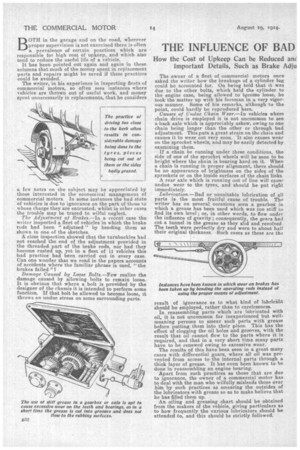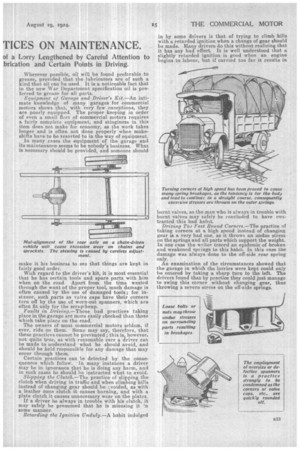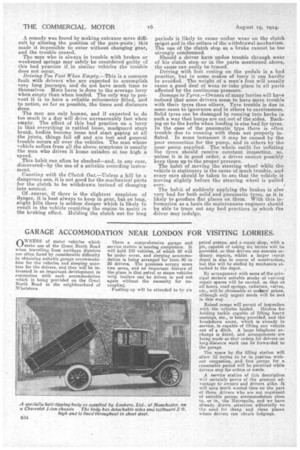THE INFLUENCE OF BAD TICES ON MAINTENANCE.
Page 14

Page 15

Page 16

If you've noticed an error in this article please click here to report it so we can fix it.
How the Cost of Upkeep Can be Reduced anC important Details, Such as Brake Adiu of a Lorry Lengthened by Careful Attention to brication and Certain Points in Driving.
BOTH in the garage and on the road, wherever proper supervision is not exercised there is often a prevalence of certain practices which are responsible for high cost of upkeep, and which also tend to reduce the useful life of a vehicle.
It has been pointed out again and again in these columns that much of the money spent in replacement parts and repairs might be saved if these practices could be avoided.
The writer, in his experience in inspecting fleets ef commercial motors, so often sees instances where vehicles are thrown out of useful work, and money spent unnecessarily in replacements, that he considers a few notes on the subject may be appreciated by those interested in the economical management of commercial motors. In some instances the bad state of vehicles is due to ignorance on the part of those to whose charge they are entrusted, whilst in other cases the trouble may be traced to wilful neglect.
The Ad ju gement of Brakes.—In a recent case the writer inspected a fleet of vehicles in which the brake rods had been " adjutsed " by bending them as shown in one of the sketches.
A close inspection showed that the turnbuckles had not reached the end of the adjustment provided in the threaded part of the brake rods, nor had they become rusted up, yet ina fleet of 11 vehicles this had practice had been carried out in every case. Can one wonder that we read in the papers accounts of accidents where the familiar phrase is used, "the brakes failed "I
Damage Caused by Loose Bolt s. —Few realize the damage caused by allowing bolts to remain loose. It is obvious that where a bolt is provided by the designer of the chassis it is intended to perform some function. If that bolt be allowed to become loose, it throws an undue stress on some surrounding parts.
The owner of a. fleet of commercial motors once asked the writer how the breakage of a cylinder lug could be accounted for. On being told that it was due to the other bolts, which held the cylinder to the engine case, being allowed to bkeome loose, he took the matter up with his foreman in a very vigorous manner. Some of his remarks, although to the point, could hardly be reproduced here.
Causes of Undue Chain Wear.—In vehicles where chain drive is employed it is not uncommon to see a back axle which is appreciably askew, owing to one chain being longer than the other or through bad adjustment: This puts a great strain on the chain and causes it to wear out very soon. "It also causes wear on the sprocket wheels, and may be easily detected by examining them.
If a chain be running under these conditions, the side of one of the sprocket wheels will be seen to be bright where the chain is bearing hard on it. When a chain is running in proper alignment, there should be no appearance of brightness on the sides of the sprockets or on the inside surfaces of the chain links.
A rear axle which is running Out of line will cause undue wear to the tyres, and should be put right immediately.
Luhrication.—Bad or unsuitable lubrication of all parts is the most fruitful cause of trouble. The writer has on several occasions seen a gearbox in which a grease has been used which was too stiff to find its own level ; or, in other words, to flow under the influence of gravity ; consequently, the gears had cut a tunnel in the grease as they slid and revolved The teeth were perfectly dry and worn to about half their original thickness, Such cases as these are the result of ignorance as to what kind of lubrict should be employed, rather than to carelessness.
In reassembling parts which are lubricated with oil, it is not uncommon for inexperienced but wellmeaning persons to smear such parts with grease before putting them into their place. This has the effect of clogging the oil holes and grooves, with the result that oil cannot flow to the parts where it is required, and that in a very short time many parts have to be renewed owing to excessive wear.
The results. of this have been seen in a great many eases with differential gears, where all oil was prevented from access to the internal parts through a thick layer of grease. It has even been known to be done in reassembling an engine bearing. Apart from such practices as those that are due to ignorance, the owner of a commercial motor has to deal with the man who wilfully misleads those over him by such practices as smearing the outsides of the lubricators with grease so as to make believe that he has filled them up.
An oiling and greasing chart should be obtained from the makers of the vehicle, giving particulars as to how frequently the various lubricators should be attended to, and this should be strictly followed. Wherever possible, oil will be found preferable to grease, provided that the lubricators are of such a kind that oil can be used. It is a noticeable fact that in the new War Department specification oil is preferred to grease for all parts.
Eqvipment of Garage and Driver's Kit.—An intimate knowledge of many garages for commercial motors shows that, with very few exceptions, they are poorly equipped. The proper keeping in order of even a small fleet of commercial motors requires a fairly complete equipment, and stinginess in, this item does not make for economy, as the work takes longer and is often not done properly when makeshifts have to be resorted to in the way of equipment.
in many cases the equipment of the garage and its maintenance seems to be nobody's business. What is necessary should be provided, and someone should make it his business to see that things are kept in fairly good order.
With regard to the driver's kit, it is most essential that he has certain tools and spare parts with him when on the road. Apart from the time wasted through the want of the proper tool, much damage is often caused by the use of damaged tools ; for instance, such parts as valve caps have their corners torn off by the use of worn-out spanners, which are often fit only for the scrap-heap.
Faults in Driving.—Those bad practices taking place in the garage are more easily checked than those which take place on the road.
The owners of most commercial motors seldom, if ever, ride on them. Some may say, therefore, that these practices cannot be prevented ; this is, however, not quite true, as with reasonable care a driver cart be made to understand what he should avoid, and should be held responsible for any damage that may occur through them. Certain practices can be detected by the consequences which follow. In many instances a driver may be in ignorance that he is doing any harm, and in such cases he should be instructed what to avoid.
Slipping the Clutch.—The practice of slipping the clutch when driving in tra,Ific and when climbing hills instead of changing gear should be .:.voided, as with a leather cone clutch it causes burning, and with a plate clutch it causes unnecessary wear on the plates. If a driver be always in trouble with his clutch, it may safely be presumed that he is misusing it some manner.
Retarding the Ignition Unduly.—A habit indulged
in by some 'drivers is that of trying to climb hills with a retarded ignition when a change of gear should be made. Many drivers do this without realizing that it has any bad effect. It is well understood that a slightly retarded ignition is good when an engine begins to labour, but if carried too far it results in burnt valves, so the man who is always in trouble with burnt valves may safely be concluded to have contracted this bad habit.
Driving Tod Fast Round Corners.—The practice of taking corners at a high speed instead of changing gear is a very bad one, as it throws an undue stress on the springs and all parts which support the weight. In one case the writer traced an epidemic of broken and weakened springs to this habit. In this case the damage was always done to the off-side rear spring only.
An examination of the circumstances showed that the garage in which the lorries were kept could only be entered by taking a sharp turn to the left. The drivers found that by practice they could just manage to swing this corner without changing gear, thus throwing a severe stress on the off-side springs. A remedy was found by making entrance more difficult by altering the position of the gate-posts ; this made it impossible to enter without changing gear, and the trouble ceased.
The man who is always in trouble with broken or weakened springs may safely be considered guilty of this bad practice if in similar vehicles the trouble does not occur.
Driving Too Fast When Empty.—This is a common fault with drivers who are expected to accomplish very long journeys, and do not have much time to themselves. More harm is done to the average lorry when empty than when loaded. The only way to prevent it is to have a reliable mileometer fitted, and to notice, so far as possible, the times and distances done.
The men are only human, and if expected to do too much in a day will drive unreasonably fast when empty. The effect of this bad practice on a lorry is that everything is rattled loose, mudguard stays break, bodies become loose and start gaping at all the joints, things fall off and are lost and general trouble occurs all over the vehicles. The man whose vehicle suffers from all the above symptoms is usually the man who drives it home unladen at too high a speed.
This habit can often be checked—and, in any case, discovered—by the use of a suitable recording instruni
Coasting with the Clutch Out,—Unless a hill be a dangerous one, it is not good for the mechanical parts for the clutch to be withdrawn instead of changing into neutral.
Of course, if there is the slightest suspicion of danger, it is best always to keep in gear, but on long, slight hills there is seldom danger which is likely to result in the vehicle requiring the engine to assist in the braking effect. Holding the clutch out for long periods is likely to cause undue wear on the clutch spigot and in the collars of the withdrawal mechanism. The use of the clutch stop as a brake cannot he too strongly condemned. Should a driver have undue trouble through wear of his clutch stop or in the parts mentioned above, the cause can easily be traced.
Driving with feet resting on the pedals is a bad practice, but in some makes of lorry it can hardly be avoided. The weight of a man's foot will usually cause a good deal of wear to take place in all parts affected by the continuous pressure. Damage to Tyres.—Owners of many lorries will have noticed that some drivers seem to have more trouble with their tyres than others. Tyre trouble is due in some cases to ignorance and in others to carelessness. Solid tyres can be damaged by running into kerbs in such a way that lumps are cut out of the sides. Backing on to the kerbs when loading is also bad for tyres. In the case of the pneumatic type there is often trouble due to running with them not properly inflated. In some instances it may be caused by the poor connection for the pump, and in others by the poor pump supplied. The whole outfit for inflating the tyres should receive constant inspection, as, unless it is in good order, a driver cannot possibly. keep them up to the proper pressure. The habit of moving the steering wheel while the vehicle is stationary is the cause of much trouble, and every care should be taken to see that the vehicle is moving slightly before the steering wheel is pulled over.
The habit of suddenly applying the brakes is also -very bad for both solid and pneumatic tyres, as it is likely to produce flat places on them. With this information as a basis the maintenance engineer should be able to trace out any bad practices in which the driver may indulge.






























